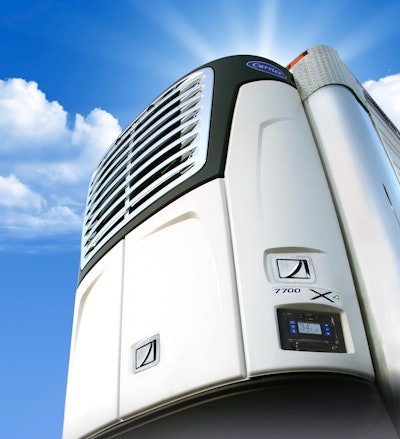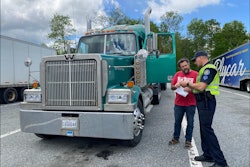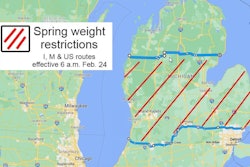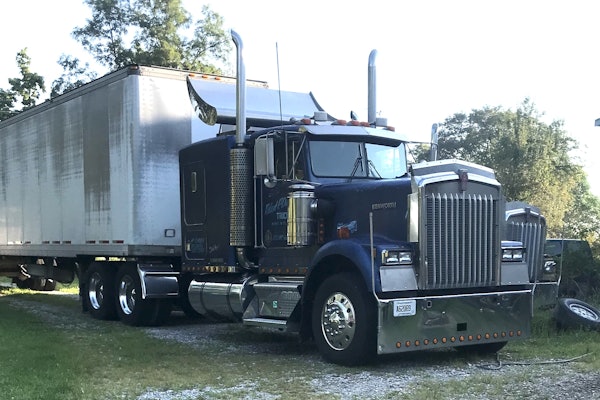Trucking news and briefs for Wednesday, March 1, 2023:
Roadcheck inspection blitz to focus on ABS, cargo securement
The Commercial Vehicle Safety Alliance has announced inspectors will focus on anti-lock braking systems and cargo securement during the May 16-18 International Roadcheck.
Roadcheck is a high-visibility, high-volume 72-hour inspection and enforcement event where CVSA-certified inspectors in Canada, Mexico and the U.S. conduct inspections of commercial motor vehicles and drivers at weigh/inspection stations, designated inspection areas and along roadways.
Although ABS violations are not out-of-service violations, ABS play a critical role in reducing the risk of collisions by preventing the wheels from locking up or skidding, allowing a driver to maintain control of the vehicle while braking, CVSA said.
Additionally, improper cargo securement poses a serious risk to drivers and other motorists by adversely affecting the vehicle’s maneuverability, or worse, causing unsecured loads to fall, resulting in traffic hazards and vehicle collisions.
During Roadcheck, inspectors will conduct their usual roadside safety inspections of commercial vehicles and drivers. During a routine North American Standard Level I Inspection, inspectors focus on two areas:
- Vehicle safety -- Inspectors will ensure the vehicle’s brake systems, cargo securement, coupling devices, driveline/driveshaft components, driver’s seat, fuel and exhaust systems, frames, lighting devices, steering mechanisms, suspensions, tires, wheels, rims, hubs and windshield wipers are compliant with regulations.
- Driver safety -- Inspectors will check the driver’s operating credentials, hours-of-service documentation, status in the Drug and Alcohol Clearinghouse, seat belt usage, and for alcohol and/or drug impairment.

Vehicles that successfully pass a Level I or Level V Inspection without any critical vehicle inspection item violations may receive a CVSA decal, which is valid for three months. If the inspector does identify critical vehicle inspection item violations, as outlined in the North American Standard Out-of-Service Criteria, the vehicle will be restricted from operating until the identified out-of-service conditions have been corrected. Inspectors may also restrict the driver from operating if the driver is found to have driver out-of-service violations, such as not possessing a valid or necessary operating license or exhibiting signs of impairment.
ATRI seeks operational cost data from fleets
The American Transportation Research Institute has issued a request for motor carriers to participate in its annual update to its Operational Costs of Trucking report.
ATRI’s annual Operational Costs of Trucking is one of the most used and comprehensive benchmarking tools in the trucking industry. ATRI confidentially collects costs and operational data directly from trucking fleets and owner-operators, and its analysis reveals key trends for fleets of each sector, size, and region.
The fleet metrics requested by ATRI include driver pay, fuel costs, insurance premiums, and equipment lease or purchase payments. Carriers and owner-operators are asked to provide full-year 2022 cost per mile and/or cost per hour data through an easy-to-use online data entry form or email submission. By carrier request, this year’s report includes valuable new efficiency metrics, such as miles between breakdowns.
Participating motor carriers will once again receive a customized report that compares their fleet’s costs and operations to peer carriers of the same sector and size, as well as an advance copy of the full report.
For-hire motor carriers are encouraged to provide operational cost data to ATRI by Friday, April 28. ATRI’s data collection form is available online here. All confidential information is protected, and it is published only in anonymized, aggregate form.
[Related: Trucking costs soared in 2021, led by jump in diesel prices]
New fuel-efficient, CARB-compliant Carrier Transicold reefer unit available
 The new Carrier Transicold X4 7700 is now available at the company's North American dealers.Carrier Transicold
The new Carrier Transicold X4 7700 is now available at the company's North American dealers.Carrier Transicold
“In full production at our world-class manufacturing facility in Athens, Georgia, the new premium performance X4 7700 single-temperature unit builds on the X4 platform’s decade-long reputation for high capacity and rugged, dependable service,” said Bill Maddox, Senior Manager of Product Management, Truck Trailer Americas, Carrier Transicold. “Continuing the tradition of reliable design and simply smarter engineering, the X4 7700 unit offers a 96% reduction in particulate emissions and double-digit gains in fuel efficiency compared to standard X4 models.”
The new unit employs an advanced version of the smart engine used throughout Carrier Transicold’s existing trailer platforms. Benefits of the new unit include lifetime compliance with the California Air Resources Board’s stricter rules for reefer units; better fuel economy compared to standard X4 units; greater sustainability with more eco-friendly refrigerant; and lighter weight.
All X4 7700 units are equipped with Carrier Transicold’s Lynx Fleet telematics offering for remote monitoring of temperatures, location, movement and system operating performance. To help maintain the charge of the battery supporting the unit and its telematics system, Carrier Transicold now also offers its TRU-Mount solar panel as a factory-installed option.









